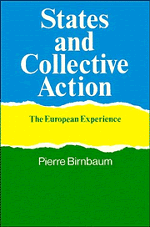Book contents
- Frontmatter
- Contents
- Acknowledgements
- Introduction
- 1 Mobilisation theory and the state: the missing element
- 2 States, free riders and collective movements
- 3 The state and mobilisation for war: the case of the French Revolution
- 4 Ideology, collective action and the state: Germany, England, France
- 5 Individual action, collective action and workers' strategy: the United States, Great Britain and France
- 6 The state versus corporatism: France and England
- 7 The Nazi collective movement against the Prussian state
- 8 Territorial and ethnic mobilisation in Scotland, Brittany and Catalonia
- 9 Nation, state and culture: the example of Zionism
- 10 The state, the police and the West Indians: collective movements in Great Britain
- Conclusion: the end of the state? From differentiation to dedifferentiation
- Notes
- Index
2 - States, free riders and collective movements
Published online by Cambridge University Press: 04 August 2010
- Frontmatter
- Contents
- Acknowledgements
- Introduction
- 1 Mobilisation theory and the state: the missing element
- 2 States, free riders and collective movements
- 3 The state and mobilisation for war: the case of the French Revolution
- 4 Ideology, collective action and the state: Germany, England, France
- 5 Individual action, collective action and workers' strategy: the United States, Great Britain and France
- 6 The state versus corporatism: France and England
- 7 The Nazi collective movement against the Prussian state
- 8 Territorial and ethnic mobilisation in Scotland, Brittany and Catalonia
- 9 Nation, state and culture: the example of Zionism
- 10 The state, the police and the West Indians: collective movements in Great Britain
- Conclusion: the end of the state? From differentiation to dedifferentiation
- Notes
- Index
Summary
Analysis of the state and of collective action requires, to put it succinctly, a thoroughgoing discussion of methodology, for social facts of this order can in fact be analysed just as effectively in terms of a structural perspective, which gives the whole precedence over its component parts, as in terms of the function of the action of individual actors, who perform on the basis of the roles they have in each of these structured ensembles. The opposition between holism and individualism may therefore be applied just as readily to a study of the state as to social movements. For Durkheim, ‘the whole does not equal the sum of its parts’, and therefore ‘the group thinks, feels, and acts entirely differently from the way its members would if they were isolated. If therefore we begin by studying these members separately, we will understand nothing about what is taking place in the group.’ Which is why, as far as Durkheim is concerned, these social facts ‘consist of manners of acting, thinking, and feeling, external to the individual, which are invested with a coercive power by virtue of which they exercise control over him’. If one adopts a structural perspective of this kind, action depends upon the function which the actor exercises within the whole, upon the roles which are connected to that function, and upon the values and norms which are peculiar to the group and which exercise a kind of social control over each of the actors who are members of it.
- Type
- Chapter
- Information
- States and Collective ActionThe European Experience, pp. 43 - 54Publisher: Cambridge University PressPrint publication year: 1988



